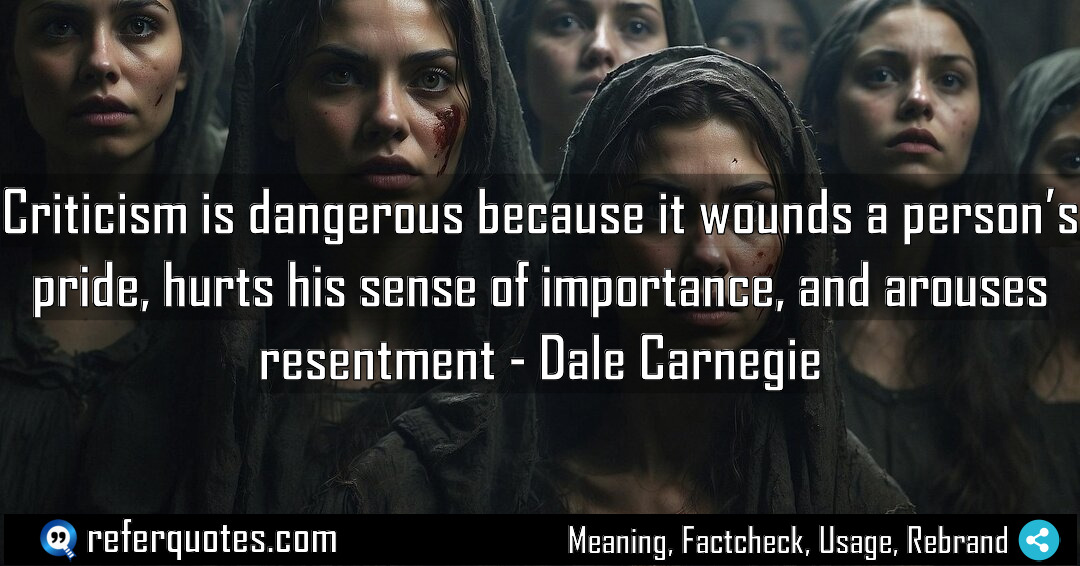
Criticism is dangerous because it wounds… It’s a simple truth, but one that fundamentally reshapes how you lead and connect with people.
Share Image Quote:
Table of Contents
Meaning
At its core, this quote means that criticism is a direct attack on a person’s ego and sense of self-worth, and the natural human response to that attack is a defensive, resentful backlash.
Explanation
Let me tell you, this is one of those principles that seems obvious once you hear it, but it’s so easy to forget in the moment. We think we’re “giving constructive feedback,” but what the other person hears is an assault on their pride. That sense of importance Carnegie talks about? It’s not vanity. It’s the fundamental human need to feel valued and capable. When you criticize, you’re not just pointing out a mistake; you’re threatening that core need. And the resentment that follows… it’s a silent killer of teamwork, morale, and trust. It doesn’t matter if you’re “right.” The damage is done.
Quote Summary
Reading Level55
Aesthetic Score70
Origin & Factcheck
This quote comes straight from Dale Carnegie’s legendary 1936 book, How to Win Friends and Influence People, published in the United States. You’ll sometimes see similar sentiments misattributed to other self-help figures, but this is pure Carnegie, forming the bedrock of his entire philosophy on human relations.
Attribution Summary
Author Bio
Dale Carnegie(1888), an American writer received worldwide recognition for his influential books on relationship, leadership, and public speaking. His books and courses focus on human relations, and self confidence as the foundation for success. Among his timeless classics, the Dale Carnegie book list includes How to Win Friends and Influence People is the most influential which inspires millions even today for professional growth.
Official Website |Facebook | X | Instagram | YouTube |
Where is this quotation located?
| Quotation | Criticism is dangerous because it wounds a person’s pride, hurts his sense of importance, and arouses resentment |
| Book Details | Publication Year/Date: 1936 original, Revised Edition 1981, ISBN/Unique Identifier: 9780671723651, Last edition. Number of pages: Revised Edition 1981, approx 291 pages |
| Where is it? | Part One: Fundamental Techniques in Handling People, Chapter 1 |
Context
In the book, this idea is part of Carnegie’s first major principle: “Don’t criticize, condemn, or complain.” He lays it out right at the beginning because it’s the foundational rule. He backs it up with stories about figures like Abraham Lincoln, who learned the hard way that public criticism of political opponents only created lifelong enemies.
Usage Examples
So, who is this for? Honestly, everyone. But let’s get specific.
For a Manager: Instead of telling a team member, “Your report was sloppy and full of errors,” try, “I see a lot of great groundwork in this report. Let’s work together to tighten up the data in section three to make your argument even stronger.” You address the issue without attacking the person.
For a Spouse or Partner: Instead of, “You never do the dishes!” which is pure criticism, you could say, “I feel really overwhelmed when the kitchen is messy at the end of the day. Could we figure out a system for the dishes that works for both of us?” It’s about the situation, not their character.
For a Colleague: If a peer misses a detail in a shared project, framing it as “We need to make sure we cross all our t’s, I noticed this one might have been overlooked” is far more effective than “You messed this up.”
To whom it appeals?
Share This Quote Image & Motivate
Motivation Score68
Popularity Score90
Shareability Score82
Common Questions
Question: So, we should never give feedback?
Answer: Not at all! The key is to separate the action from the person. Critique the work, the behavior, or the outcome, not their intelligence or worth. Guide instead of condemn.
Question: What if the criticism is justified and true?
Answer: That’s the trick, right? The truth of the criticism doesn’t magically stop it from wounding pride. In fact, a true criticism can often hurt *more*. The result—the resentment—is what makes it “dangerous,” even when you’re right.
Question: How do you handle someone who is consistently underperforming?
Answer: This is where it gets tough. Carnegie’s principle isn’t about ignoring problems. It’s about choosing a more effective method. Shift the conversation to shared goals, ask open-ended questions to understand their challenges, and focus on coaching for future performance rather than punishing past failure.
Question: Isn’t this just about being nice?
Answer: It’s deeper than that. It’s about being *effective*. Being “nice” can be passive. This is a strategic understanding of human psychology. You’re not avoiding criticism to be polite; you’re avoiding it because it’s a counterproductive tool that breaks down the very influence you’re trying to build.
Similar Quotes
You know, that idea that “Criticism is futile; it puts a person on the defensive” is one of those game-changers. It completely reframes how you approach giving feedback, shifting the…
Criticism is futile because it puts… it’s a game-changing insight into human psychology that flips traditional leadership on its head. Table of Contents Meaning Explanation Origin & Factcheck Context Usage…
You know, that idea that “Fear of criticism robs man of his initiative”… it’s one of those truths that hits harder the longer you’re in the game. It’s not just…
Remember that unjust criticism is often a disguised compliment. It sounds counterintuitive, but once you see it, it changes everything. Let’s break down why this is such a powerful mindset…
Don’t be afraid of criticism because the only way to truly avoid it is to do absolutely nothing. It’s a powerful reminder that putting yourself out there, whether in your…
